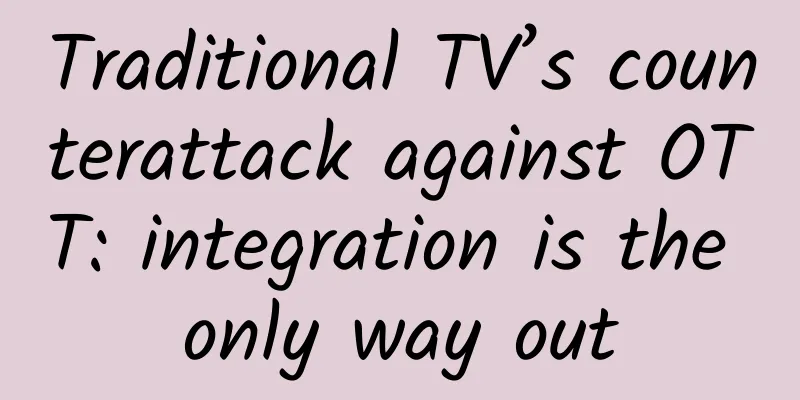Traditional TV’s counterattack against OTT: integration is the only way out

|
Recalling the glorious past of OTT OTT has been the pig in the whirlpool of the video industry for several consecutive years. Putting aside the explosive growth data such as user coverage, user clicks and market size, it can be seen from the stock price alone that OTT has long become the weather vane of the video industry. In the United States, the target is Netflix, whose stock price has soared from $50 per share at the beginning of 2010 to the current $450 per share, nearly 10 times higher. In China, the target is LeTV, whose stock price has soared from 5 yuan per share when it was listed in 2010 to the current 90 yuan per share, nearly 20 times higher. Add to that Hulu, Amazon, iQiyi, Youku Tudou, etc., and it is simply the spring of the OTT industry. Do you remember those exciting moments? For example, Netflix’s subscribers exceeded those of the largest cable TV operator in the United States, Netflix’s subscribers exceeded those of HBO, the top paid channel in the United States, and Netflix subverted the content production industry for the first time through big data, all of which attracted the public’s attention. Compared with the rapid development of OTT, there is no doubt that traditional TV is dying. From the annual loss of traditional TV subscribers to the slowdown or even negative growth of TV station advertising revenue. Even Hulu, which was set up by several major TV stations for transformation, seems to be tainted by the twilight of traditional TV, and news of its fate is worrying from time to time. Traditional TV has been labeled as unprogressive and it seems that the day of death is not far away. The Empire Strikes Back on Traditional Television But what OTT got was a swift and powerful counterattack from traditional TV. Take HBO, the originator of traditional pay TV, for example. It actually launched the interactive on-demand brand HBO GO very early, but the premise is that users must subscribe to the corresponding cable or satellite TV paid product package to watch it. Now HBO has gone all out and launched a new OTT brand HBO NOW, which users can subscribe to for just over a dozen dollars and watch almost all of HBO's content. Please note the adjective "separate subscription", which means that users no longer need to subscribe to cable TV or satellite TV packages, but can subscribe to HBO's program content through the Internet. Users can really say, go to the cable TV, and fuck the $15 per month HBO. Do you know what this means for HBO? HBO has about 30 million subscribers in North America, and its current annual revenue of $5.4 billion is almost entirely obtained through cable TV channels, with a profit of $1.8 billion and a profit margin of 33.3%. In comparison, Netflix has about 40 million subscribers in North America, and about 85% of its current annual revenue of $5.5 billion is obtained through streaming channels, with a profit of $400 million and a profit margin of 7.3%. HBO launched its independent OTT brand HBO NOW, which means HBO is risking a lot of cable TV revenue and profits to compete head-on with Netflix. Entering the network requires huge CDN costs, a lot of technical operation and maintenance costs, and even the cost of purchasing copyrights. It can be said that what HBO did was beyond the tactical level and was definitely a strategic move. The effect was immediate, with HBO's new subscribers in 2014 exceeding the total of the past 30 years. Another TV giant, CBS, also launched its online video business brand CBS All Access in mid-October 2014. With a monthly fee of $5.99, all subscribers can watch the current season's hits and past classics in full, and some regions also support online live streaming. Within just a few months after its launch, it covered more than half of American households and had hundreds of thousands of subscribers. In addition to direct OTT from TV stations, traditional TV operators represented by Comcast and Dish also retain users by providing streaming services (such as SlingTV). The financial reports disclosed by these traditional TV operators show that the loss of TV users has slowed down significantly, and the most difficult time has passed. Don't just look at foreign countries. In fact, domestic TV stations have also made considerable moves in OTT (of course, this is also related to OTT control and publicity strategies). The first to bear the brunt is Hunan Radio and Television, which has made great efforts to implement the new media strategy of Mango TV by relying on the exclusive broadcast of high-quality variety shows. Judging from the response, it has achieved initial results. After Uncle Li came back, SMG also shouted the slogan of "Internet transformation". The five major business groups that were restructured have the shadow of the Internet, and 2.5 billion ammunition has been prepared in OTT. As for another special company, Wasu, it has been radiant since it tied up with the big tree of Alibaba, and its new media has been very successful. On the contrary, CCTV, which plays the leading role, has not made much progress in OTT, so much so that CCTV changed its director, and some people interpreted it as a move to develop new media. When OTTs were preparing to O others, they suddenly found that traditional television, with its networks, content and users, launched an imperial counterattack. Why do it now? In fact, many people have questions. Since TV stations can OTT others, why didn't they do it earlier? Why wait until Netflix and LeTV are so popular? First, what do TV stations rely on for their livelihood? They rely on content. As for who to sell the content to? We sell it to whoever offers the highest price. If OTT has money, we let them buy it at a high price. Since we can make money through traditional channels, and make big money, why should we spend time on making small money on online channels, and may even lose big money? So for downstream channels, we should wait and see, let the "scapegoats" charge forward, and wait until the situation is clear, and then use the money in our hands to invest, anyway, the content is with us. So don't look at HBO's current ambitions on the Internet. In 2012, more than 100,000 people signed to request HBO to launch an online version, but they were unmoved. Now we have to do it, and do it on a large scale, which means that the market trend is on the eve of a dramatic change, and we need to get in and occupy a position. To put it bluntly, tactics serve strategy. Second, it seems simple to do OTT by yourself. In fact, it requires great technical and professional operation capabilities. What do TV stations do? They make content. OTT is not just about setting up a few servers, getting rid of the channel parties, and selling your content directly to users. You want it to deal with C++, PV, and VV every day? So these are all processes that require gradual accumulation. After these years of learning and learning, I think I have learned almost everything. The Internet's current communication capabilities can be said to be comparable to those of traditional television, and TV stations have been constantly preparing in recent years. It is only natural that they are now moving towards OTT and new media. However, when these TV stations start their own OTT, what should those who claim to be "OTT" do? Can they still obtain content? Can they still obtain users? Hey, don't be pessimistic. OTT also has advantages, that is, to achieve the integration of "technology and art" through technology, and TV stations achieve the integration of "technology and art" through content. As economics says, competition is not about eliminating rivals, but about improving efficiency. The competition between OTT and TV stations is definitely not a life-and-death struggle. In the end, everyone will reach the same destination and truly achieve integration. You are me and I am you. This is not a unilateral elimination process. Both the backward productivity of TV stations and the backward productivity of OTT will be eliminated. Netflix’s CEO once said something cool: “Our goal is to become HBO before HBO becomes us.” In other words, OTT new media can also become a TV station. In fact, he forgot to say one thing: My fellow Chinese OTT colleagues, please omit the last sentence, otherwise you will bear the consequences at your own risk! The good show of OTT has just begun! As a winner of Toutiao's Qingyun Plan and Baijiahao's Bai+ Plan, the 2019 Baidu Digital Author of the Year, the Baijiahao's Most Popular Author in the Technology Field, the 2019 Sogou Technology and Culture Author, and the 2021 Baijiahao Quarterly Influential Creator, he has won many awards, including the 2013 Sohu Best Industry Media Person, the 2015 China New Media Entrepreneurship Competition Beijing Third Place, the 2015 Guangmang Experience Award, the 2015 China New Media Entrepreneurship Competition Finals Third Place, and the 2018 Baidu Dynamic Annual Powerful Celebrity. |
<<: Do we really need bezel-less phones?
>>: When Apple Watch is pre-sold, let's talk about Xiaomi bracelet
Recommend
How to apply for a WeChat Mini Program account? How does a company register and develop a mini program?
Q: How to apply for a WeChat Mini Program account...
Disassembling 6 ways to play red envelopes in event marketing
Red envelopes are a value-added service provided ...
Apple's stock price hits a new high: Should we cheer?
Recently, Apple's stock price hit a record hi...
May Day air ticket blind box marketing model!
In one week, the whole nation will usher in the h...
Going to the toilet after drinking water vs not going to the toilet after drinking water, which is healthier?
《Cotton Swab Medical Science Popularization》 Depa...
What is the origin of the popular Tarzan "robot dog"? Netizen: I have a bold idea...
recently On the mountain road in Mount Tai scenic...
The most comprehensive analysis of enterprise WeChat operations!
Enterprise WeChat 3.0 version was released, openi...
The closest black hole to the solar system has been discovered, and it is only 1,000 light-years away from us!
[Mobile software: Bo Ke Yuan] A team of astronome...
2,400 meters underground, the country's most important equipment is put into operation! Why is the world's deepest and largest deep underground laboratory in Jinping?
On December 7, the civil engineering and public w...
Google launches simplified Android system in India to develop low-end market
Google recently released a simplified version of ...
Amazon Advertising Bidding Mechanism & Ranking Principles In-depth Analysis
When placing advertisements, Amazon sellers first...
With an annual profit of over 900 million, Jiuyou launched the platform 2.0 strategy
On March 16, 9game's 2015 annual strategy con...
How to use WeChat to remotely control your computer
I believe many people have experienced using mobi...
The OnePlus phone started out at 1,999 yuan, but now the 7 Pro is priced at 4,000 yuan. Is it still worth buying?
OnePlus officially released its new OnePlus 7 ser...
Does Yinchuan Mini Program Mall need to apply for a business license?
Can an e-commerce business license be used to ope...









